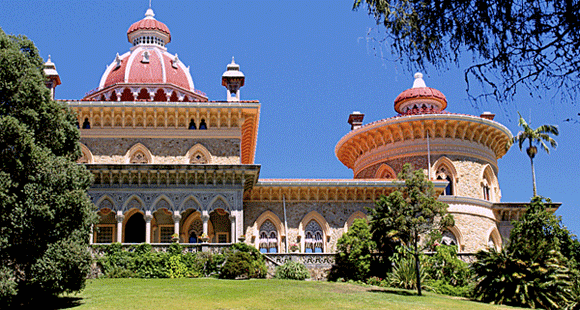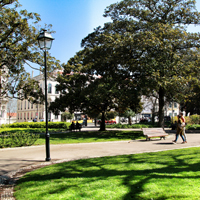Sintra, Portugal
Last updated on Mar 11, 2025
Summary: Expats, digital nomads and retirees talk about what it is really like living in Sintra, Portugal. They offer advice about meeting people, cost of living, finding a home and more.

What do I need to know about living in Sintra?
When we asked people what advice they would give someone preparing to move to Sintra, they said:
"Sintra is a picturesque town known for its stunning architecture, lush gardens, and mild climate, making it an attractive destination for expats looking to retire. Before making the move, there are several things to consider. Firstly, understanding the cost of living is crucial. While Portugal is generally more affordable than many European countries, Sintra is a popular tourist destination, which can drive up prices. This applies to everything from housing to groceries and dining out. Next, consider the language barrier. While English is commonly spoken in tourist areas and by younger generations, many locals, particularly older ones, primarily speak Portuguese. Learning some basic Portuguese phrases can be beneficial. Healthcare in Portugal is of a high standard and is affordable. However, it's important to understand how the system works. Expats from EU countries can use their European Health Insurance Card (EHIC) for access to healthcare, while those from outside the EU will need to secure private health insurance. Portugal has a favorable tax regime for foreign retirees, known as the Non-Habitual Resident (NHR) scheme. This allows for a tax-free pension for ten years, but it's important to consult with a tax advisor to understand the specifics. The climate in Sintra is generally mild, with warm summers and cool, wet winters. However, the town is located in the mountains, which can lead to cooler temperatures and more rainfall than in other parts of Portugal. Public transportation in Sintra is reliable and affordable, with regular train service to Lisbon. However, having a car can be beneficial for exploring the surrounding areas. Finally, it's important to understand the process of buying property in Portugal. This includes understanding the legal requirements, finding a reliable real estate agent, and securing a fiscal number (NIF) which is required for any financial transactions in Portugal," said one expat who made the move to Sintra.
 AGS Worldwide Movers
AGS Worldwide MoversGet Quote
Relocating abroad soon? Make your move with AGS! AGS Worldwide Movers is a leader in the international moving industry. Our experience and expertise allows us to guarantee our clients the best quality moving services.
 AGS Worldwide Movers
AGS Worldwide MoversRelocating abroad soon? Make your move with AGS! AGS Worldwide Movers is a leader in the international moving industry. Our experience and expertise allows us to guarantee our clients the best quality moving services.
Get Quote
What do I need to know before moving to Sintra?
When we asked people what advice they would give someone preparing to move to Sintra, they said:
"Sintra is a picturesque town known for its stunning architecture, lush gardens, and historical sites. Before moving to Sintra, expats should be aware that the official language is Portuguese, and while English is commonly spoken in tourist areas, it may not be as widely spoken in residential areas. The cost of living in Sintra is generally lower than in many other European cities, but it's still important to budget carefully. The town is well-connected to Lisbon by public transportation, making it easy to commute for work or leisure. The climate in Sintra is Mediterranean, with mild, rainy winters and warm, dry summers. The town is known for its microclimate, which can cause sudden changes in weather, so it's advisable to always carry a light jacket or umbrella. Healthcare in Portugal is of a high standard, with both public and private options available. Expats moving to Sintra should ensure they have adequate health insurance coverage. Portuguese cuisine is a highlight of living in Sintra, with local specialties including seafood, pastries, and wine. The education system in Portugal is well-regarded, with a mix of public and private schools, as well as international schools. However, spaces in international schools can be limited, so it's advisable to apply well in advance. Portugal has a relaxed pace of life, and this is especially true in Sintra. The town is quieter and less bustling than larger cities like Lisbon or Porto. Finally, it's important to note that while Sintra is a safe town, standard precautions should be taken to protect against petty crime, as is the case in any tourist destination," explained one expat living in Sintra, Portugal.
How do I find a place to live in Sintra?
We asked expats how they chose their neighborhood and found a place to live. They answered:
"Finding a place to live in Sintra involves several steps. First, you need to determine your budget and the type of accommodation you're looking for. This could range from an apartment, a house, or even a villa, depending on your preference and financial capability. Next, you should research the different neighborhoods in Sintra to find one that suits your lifestyle and needs. Some popular areas include the historic center, the coastal area of Colares, and the more rural areas of São Pedro and Santa Maria. Once you have a clear idea of what you're looking for, you can start your search. There are several online platforms where you can find listings for properties in Sintra, such as Idealista, Imovirtual, and OLX. These websites allow you to filter your search based on location, price, size, and other features. In addition to online searches, you might also want to consider hiring a real estate agent. They can provide valuable local knowledge, help negotiate prices, and guide you through the legal process of renting or buying a property in Portugal. When you find a property you're interested in, arrange a viewing. This will give you a chance to inspect the property, ask questions, and get a feel for the neighborhood. If you decide to proceed with a property, you'll need to negotiate the terms of the lease or purchase agreement. This will include the price, the length of the lease (if renting), and any other conditions. Once the terms are agreed upon, you'll need to sign a contract. If you're renting, you'll also likely need to pay a deposit. If you're buying, you'll need to go through the process of transferring ownership, which involves notary and registration fees. Finally, once all the paperwork is completed and the payments are made, you can move into your new home in Sintra," remarked one expat living in Sintra, Portugal.
What is a typical expat home or apartment like in Sintra?
"A typical expat home or apartment in Sintra, is often a blend of traditional Portuguese architecture and modern amenities. These homes are usually spacious, with large windows that let in plenty of natural light and offer stunning views of the surrounding landscapes. The interiors are often tastefully decorated, with a mix of contemporary and classic Portuguese furnishings. Many homes feature terracotta tiled floors and whitewashed walls, giving them a rustic yet elegant feel. Kitchens are typically equipped with modern appliances, and bathrooms are often updated with high-end fixtures. Many homes also have outdoor spaces, such as balconies or terraces, where residents can enjoy the mild Portuguese climate. Some expat homes may also have a small garden or courtyard. In terms of location, many expat homes in Sintra are situated in peaceful, residential neighborhoods, often within walking distance to local shops, restaurants, and other amenities. Some homes may also be located near the coast, offering beautiful sea views. Despite being close to amenities, these homes often offer a sense of tranquility and privacy, making them ideal for those looking to enjoy a relaxed lifestyle in Portugal. In addition to standalone homes, there are also many apartments available for expats in Sintra. These apartments often come with shared amenities such as swimming pools, gyms, and communal gardens. They are typically located in well-maintained buildings, often with secure entry systems and sometimes with onsite property management. Overall, expat homes in Sintra, Portugal, offer a comfortable and luxurious living experience, combining the charm of Portuguese architecture with the conveniences of modern living," said one expat who made the move to Sintra.
What is the average cost of housing in Sintra?
If you are thinking about moving to Sintra, cost of living in probably a key consideration. Expats commented about the cost of housing:
"The average cost of housing in Sintra can vary greatly depending on the location and size of the property. However, as of recent data, a typical price for a residential property in this area can range from moderately priced to quite expensive. For instance, a standard apartment in the city center may cost less than a luxury villa in the more affluent neighborhoods or coastal areas. It's always recommended to conduct thorough research or consult with a real estate professional to get the most accurate and current housing prices in Sintra, Portugal," remarked one expat who made the move to Sintra.
How do I meet people in Sintra?
When we asked people living in Sintra about club and activities where newcomers can meet others, they responded:
"Expats in Sintra often join various clubs and activities to meet new people and immerse themselves in the local culture. These include language exchange clubs, where they can learn Portuguese and teach their native language to locals. They may also join sports clubs, such as golf, tennis, or surfing, which are popular activities in the area. Cultural clubs are also a great way to meet people and learn about Portuguese history and traditions. These can include cooking classes, wine tasting groups, or art and photography clubs. Expats may also participate in local festivals and events, such as the annual Sintra Music Festival, which is a great opportunity to meet locals and other expats. Volunteering is another way to meet people and give back to the community. There are many opportunities to volunteer in Sintra, from helping out at local schools to participating in environmental conservation projects. In addition to joining clubs and participating in activities, expats often meet people through their work or their children's schools. Many expats also use online platforms and social media groups to connect with other expats in the area. Finally, simply exploring the city, visiting local markets, cafes, and restaurants, or taking a walk in the beautiful parks and gardens of Sintra can lead to unexpected encounters and new friendships," remarked one expat who made the move to Sintra.
What should I bring when moving to Sintra?
People living in Sintra were asked what three things they wish they had brought and three they wish they had left behind. They wrote:
"When moving to Sintra, you should pack a variety of clothing suitable for a Mediterranean climate, including lightweight clothing for the warm summers and heavier clothing for the cooler winters. Don't forget to pack a good quality raincoat and umbrella, as Sintra is known for its rainy winters. Comfortable walking shoes are a must, as the town is hilly and has many cobblestone streets. Pack your essential documents such as passport, driver's license, and any necessary visas or work permits. If you take prescription medication, bring an adequate supply along with a copy of your prescription. Bring a universal power adapter for your electronics, as the plugs in Portugal may be different from your home country. If you plan on driving, consider bringing an international driving permit. Pack personal hygiene items, although keep in mind that most things can be bought locally. If you have a favorite brand that might not be available in Portugal, consider bringing it with you. Don't forget to pack items that will help you feel at home in your new place, such as photos, favorite books, or comfort foods. Lastly, bring an open mind and a sense of adventure to fully enjoy the beauty and culture of Sintra," commented one expat who made the move to Sintra.
Where should I setup a bank account in Sintra?
We asked expats in Sintra what banks they use and there advice about banking. They advised:
"Sintra is a popular destination for expats due to its rich history, beautiful landscapes, and pleasant climate. Before retiring in Sintra, it's important to understand the cost of living, which is generally lower than in many other European countries, but higher than other parts of Portugal. Healthcare in Portugal is of a high standard and affordable, but it's recommended to have private health insurance to cover any unexpected costs. Portugal has a favorable tax regime for retirees, known as the Non-Habitual Resident (NHR) scheme, which can provide significant tax benefits for a period of ten years. Learning the Portuguese language can greatly enhance your experience, as not everyone speaks English, especially the older generation. Portugal is generally safe, but like any other place, it's important to take precautions against petty crime. The process of buying property in Portugal is straightforward, but it's advisable to hire a lawyer to help navigate the legalities. Portugal has a slower pace of life, which can be a big adjustment for those used to a fast-paced lifestyle. Public transportation in Sintra is reliable, but having a car can be beneficial for exploring more remote areas. Portugal has a strong culture of food and wine, with a Mediterranean diet that is both delicious and healthy. Finally, it's important to understand the cultural norms and customs of Portugal to integrate smoothly into the local community," remarked one expat living in Sintra, Portugal.
Will I be able to find a job in Sintra?
When we asked people about industries and career opportunities in Sintra, they reponded:
"Foreigners in Sintra often work in the tourism industry, serving as tour guides, hotel staff, or restaurant employees due to the city's popularity as a tourist destination. They may also find employment in language schools as English teachers. Some foreigners work in real estate, helping other expats to find suitable accommodation. Others may be employed in international companies or start their own businesses, particularly in sectors like technology, arts, and crafts. Additionally, some foreigners work remotely for companies in their home countries while living in Sintra," commented one expat who made the move to Sintra.
What is life like in Sintra?
When we asked people living in Sintra what life is like and how people spend their time, they said:
"Life for expats and digital nomads in Sintra is often described as relaxed and culturally rich. The town is known for its stunning architecture, lush gardens, and historical sites, providing plenty of opportunities for exploration and photography. The cost of living is relatively low compared to other European cities, making it an attractive destination for those working remotely. The local community is friendly and welcoming, with many locals speaking English, which makes it easier for expats to settle in. The food scene in Sintra is diverse and delicious, with a wide range of Portuguese and international cuisines available. The town is also well-connected to Lisbon, Portugal's capital, which is just a short train ride away. This makes it easy for digital nomads and expats to enjoy the vibrant city life of Lisbon while living in the peaceful and picturesque town of Sintra. The climate in Sintra is mild, with warm summers and cool, wet winters. This makes it a great place for outdoor activities like hiking and surfing. The town also has a good infrastructure with reliable internet, which is crucial for digital nomads. However, it's worth noting that while Sintra is a beautiful and peaceful place to live, it can get crowded with tourists, especially during the summer months. This can make the town feel less like a local community and more like a tourist hotspot. Overall, life for expats and digital nomads in Sintra offers a unique blend of natural beauty, historical charm, and modern conveniences," remarked one expat living in Sintra, Portugal.

Portugal Residency Advisors is a full-service consulting firm dedicated to providing personalized services to individuals and families seeking to relocate to Portugal. With a team of experienced professionals and strategic partnerships, we are well-positioned to assist clients with all aspects of the relocation process.
Click connect to have our partner contact you via e-mail and/or phone.

Portugal Residency Advisors is a full-service consulting firm dedicated to providing personalized services to individuals and families seeking to relocate to Portugal. With a team of experienced professionals and strategic partnerships, we are well-positioned to assist clients with all aspects of the relocation process.
Click connect to have our partner contact you via e-mail and/or phone.
What do expats in Sintra appreciate most about the local culture?
"Expats in Sintra often appreciate the rich history and architecture of the area, with its stunning palaces and castles that offer a glimpse into Portugal's past. They also value the warm and welcoming nature of the local people, who are known for their hospitality and friendliness. The relaxed pace of life is another aspect that expats enjoy, as it allows them to slow down and appreciate the beauty around them. The local cuisine, which is both delicious and diverse, is another highlight for many expats. Additionally, they appreciate the vibrant arts scene, with numerous festivals and cultural events taking place throughout the year. The natural beauty of Sintra, with its lush forests and stunning coastline, is also highly valued by expats. Lastly, the affordability of life in Sintra compared to other European destinations is a major draw for many expats," wrote a member in Sintra.
What do expats find most challenging?
"Expats in Sintra often find the language barrier to be the most challenging aspect of the local culture. Portuguese is the official language and while English is spoken in many tourist areas, it is less common in more residential or rural areas. Another challenge is the slower pace of life, which can be frustrating for those accustomed to a faster, more immediate service. This is particularly noticeable in restaurants and shops, where service can be leisurely. Understanding and adapting to Portuguese bureaucracy can also be a challenge for expats. Dealing with paperwork for visas, residency permits, or setting up utilities can be a complex and time-consuming process. The cultural emphasis on personal relationships and networks, known as "cunha", can also be difficult for expats to navigate. It's common for business and personal matters to be conducted based on personal connections, which can be confusing and frustrating for those not used to this way of operating. Lastly, while Portuguese people are generally friendly and welcoming, it can take time to form deep, meaningful friendships. This can lead to feelings of isolation or loneliness for some expats," explained one expat living in Sintra, Portugal.
Is there a lot of crime in Sintra?
We asked people if there is a lot of crime. They answered:
"Sintra, is generally considered a safe place to live and visit. Like any other place, it has its share of petty crimes such as pickpocketing and minor theft, especially in tourist-heavy areas. However, violent crime is relatively rare. The local police force is efficient and responsive, contributing to the overall safety of the area. It's always advisable for residents and visitors to take standard precautions to protect their belongings and personal safety, but Sintra does not have a reputation for high crime rates," said one expat who made the move to Sintra.
Is there a lot of diversity? Are people in Sintra accepting of differences?
"Sintra, is a culturally diverse town that has been influenced by various civilizations throughout history. This diversity is reflected in its architecture, cuisine, and local traditions. The people of Sintra are generally known for their hospitality and openness towards visitors and new residents, regardless of their cultural or ethnic backgrounds. They are typically accepting of differences and are accustomed to interacting with tourists from all over the world, given Sintra's status as a popular tourist destination. However, like any place, individual experiences may vary," wrote a member in Sintra.
 AGS Worldwide Movers
AGS Worldwide MoversGet Quote
Relocating abroad soon? Make your move with AGS! AGS Worldwide Movers is a leader in the international moving industry. Our experience and expertise allows us to guarantee our clients the best quality moving services.
 AGS Worldwide Movers
AGS Worldwide MoversRelocating abroad soon? Make your move with AGS! AGS Worldwide Movers is a leader in the international moving industry. Our experience and expertise allows us to guarantee our clients the best quality moving services.
Get Quote
What are the schools in Sintra like?
"1. Carlucci American International School of Lisbon: Located in Sintra, this school offers an American-based curriculum to students from pre-kindergarten to 12th grade. The school is accredited by the New England Association of Schools and Colleges and the Council of International Schools. It offers the International Baccalaureate Diploma Program for students in the final two years of high school. The school's website is https://www.caislisbon.org/. 2. International Preparatory School: This is a private co-educational school located in Cascais, a short distance from Sintra. It offers a British-based curriculum for children aged 3 to 11 years. The school is known for its small class sizes and personalized approach to education. The school's website is https://www.ipsschool.org/. 3. St. Julian's School: This is a private co-educational school located in Carcavelos, near Sintra. It offers a British and international curriculum to students from ages 3 to 18. The school is divided into three sections: Primary, Middle and Secondary, with the Secondary section offering the International Baccalaureate Diploma Program. The school's website is https://www.stjulians.com/. 4. St. Dominic's International School: Located in Oeiras, near Sintra, this school offers an international curriculum to students from ages 3 to 18. The school is accredited by the Council of International Schools and offers the International Baccalaureate Primary Years, Middle Years and Diploma Programs. The school's website is https://www.dominics-int.org/. 5. The British School of Lisbon: This school is located in Lisbon, a short distance from Sintra. It offers a British curriculum to students from ages 3 to 11. The school is known for its high academic standards and commitment to developing well-rounded students. The school's website is https://www.britishschool.pt/," commented one expat when asked about in Sintra.
About the Author
 Betsy Burlingame is one of the founders of Digital Nomad Exchange and the Founder and President of Expat Exchange. She launched Expat Exchange in 1997 as her Master's thesis project at NYU. Prior to Expat Exchange and Digital Nomad Exchange, Betsy worked at AT&T in International
and Mass Market Marketing. She graduated from Ohio Wesleyan University
with a BA in International Business and German.
Betsy Burlingame is one of the founders of Digital Nomad Exchange and the Founder and President of Expat Exchange. She launched Expat Exchange in 1997 as her Master's thesis project at NYU. Prior to Expat Exchange and Digital Nomad Exchange, Betsy worked at AT&T in International
and Mass Market Marketing. She graduated from Ohio Wesleyan University
with a BA in International Business and German.
Some of Betsy's articles include 12 Best Places to Live in Portugal, 7 Best Places to Live in Panama and 12 Things to Know Before Moving to the Dominican Republic. Betsy loves to travel and spend time with her family. Connect with Betsy on LinkedIn.

AGS Worldwide Movers can move you to and from anywhere in the world.
Get Quote
![]() Portugal Forum
Portugal Forum
Talk with other digital nomads and expats in Portugal on our Portugal forum - meet people, get advice and help others.
![]() Contribute
Contribute
Help others in Portugal by answering questions about the challenges and adventures of living in Portugal.
Digital Nomads in Portugal offer advice about healthcare, hospital visits, emergency rooms visits, finding a doctor and buying health insurance in Portugal.




